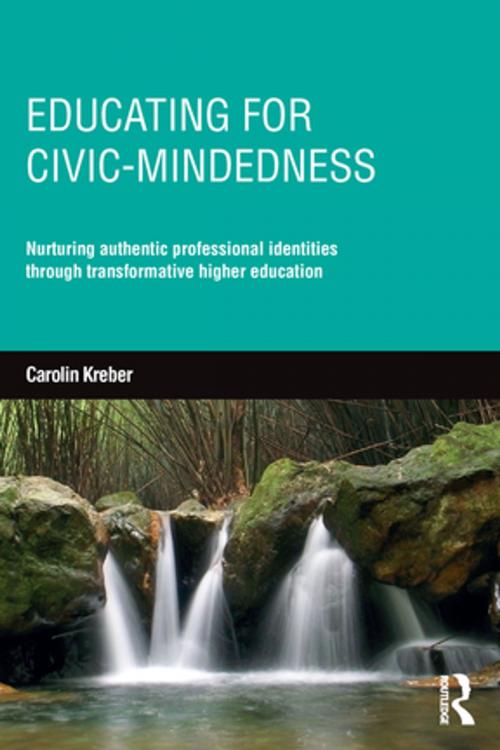Educating for Civic-mindedness
Nurturing authentic professional identities through transformative higher education
Nonfiction, Reference & Language, Education & Teaching, Higher Education| Author: | Carolin Kreber | ISBN: | 9781317196563 |
| Publisher: | Taylor and Francis | Publication: | June 17, 2016 |
| Imprint: | Routledge | Language: | English |
| Author: | Carolin Kreber |
| ISBN: | 9781317196563 |
| Publisher: | Taylor and Francis |
| Publication: | June 17, 2016 |
| Imprint: | Routledge |
| Language: | English |
Imagined at their best, how might professions contribute most effectively to their local and global communities, and how could higher education support graduates/future professionals in making this contribution? The answer proposed in this book is to educate students for ‘civic-mindedness’, an overarching professional capability grounded in certain dispositions and qualities, ideals, types of knowledge and political emotions. ‘Civic-mindedness’, and its internal counterpart, the practitioner’s self-cultivation, give rise to an engagement with professional practice that is authentic, civic and democratic. The tension between responsiveness or regard for others and regard for self is overcome by recognising that authentic professional identities are constructed through practices around shared purposes and ideals.
Drawing on a wide range of theorists including Dewey, Arendt, and Nussbaum, professions are envisaged to play a vital role. Primarily professions support society’s well-being by ensuring access to public goods, such as local and global justice, access to information, health, education, safety, housing, the beauty and sustaining power of the ecological environment, among others. Yet professions also protect the fundamental good of citizen participation in free deliberation and decision-making on issues affecting their lives. The book concludes with a vision of higher education that is transformative of graduates/professionals, pedagogies, professional practices and communities.
Issues of increasing social awareness are a key concern for anyone involved in teaching professionals and this book, which builds best practice around a sound theoretical and philosophical framework, will prove both thought-provoking and practical in application.
Imagined at their best, how might professions contribute most effectively to their local and global communities, and how could higher education support graduates/future professionals in making this contribution? The answer proposed in this book is to educate students for ‘civic-mindedness’, an overarching professional capability grounded in certain dispositions and qualities, ideals, types of knowledge and political emotions. ‘Civic-mindedness’, and its internal counterpart, the practitioner’s self-cultivation, give rise to an engagement with professional practice that is authentic, civic and democratic. The tension between responsiveness or regard for others and regard for self is overcome by recognising that authentic professional identities are constructed through practices around shared purposes and ideals.
Drawing on a wide range of theorists including Dewey, Arendt, and Nussbaum, professions are envisaged to play a vital role. Primarily professions support society’s well-being by ensuring access to public goods, such as local and global justice, access to information, health, education, safety, housing, the beauty and sustaining power of the ecological environment, among others. Yet professions also protect the fundamental good of citizen participation in free deliberation and decision-making on issues affecting their lives. The book concludes with a vision of higher education that is transformative of graduates/professionals, pedagogies, professional practices and communities.
Issues of increasing social awareness are a key concern for anyone involved in teaching professionals and this book, which builds best practice around a sound theoretical and philosophical framework, will prove both thought-provoking and practical in application.















